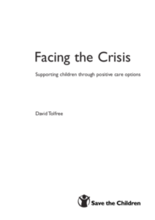Children have the right to live in a caring family environment. Governments have a responsibility to develop policies and practices, that support and strengthen families and communities to care appropriately for their children. In the changing world in which children are increasingly affected by HIV, conflict, violence, inequality and migration, the scale of children’s protection and care needs is escalating. Developing appropriate responses has proved challenging. Increased efforts are needed by governments, donors, and humanitarian, religious and non-governmental organisations (NGOs) to support families in a variety of ways that enable children to stay with their own biological or extended families, while also providing positive care options for children who require alternative living arrangements. Taking into account the evolving capacity of the child, the views of children are key to making good care decisions in their best interests, and this should be seen as part of the process of building upon the strengths and resilience of children, families and communities.
At the beginning of the twenty-first century, new challenges are facing policy-makers concerned with children’s protection and care needs. The HIV pandemic is creating a rapidly escalating care crisis on top of pre-existing high levels of need arising from poverty, conflict, natural disasters and family breakdown. In communities most affected by the pandemic, huge numbers of girls and boys are losing their parents or other care givers, placing an intolerable strain on the extended families and communities left behind. Millions more girls and boys may not have yet lost their care-givers, but they are deeply affected by the epidemic, living with and caring for sick and dying parents. Recent estimates put the number of children aged under 15 who have already been orphaned by HIV and AIDS at 14 million, and it is projected that the global figure may exceed 25m by 2010, if incidence rates continue unchecked (UNAIDS, UNICEF and USAID 2002).
In this particular context, the UN and a range of other agencies have recently reaffirmed their belief in the importance of supporting families and communities in caring for their children.
©Save the Children

